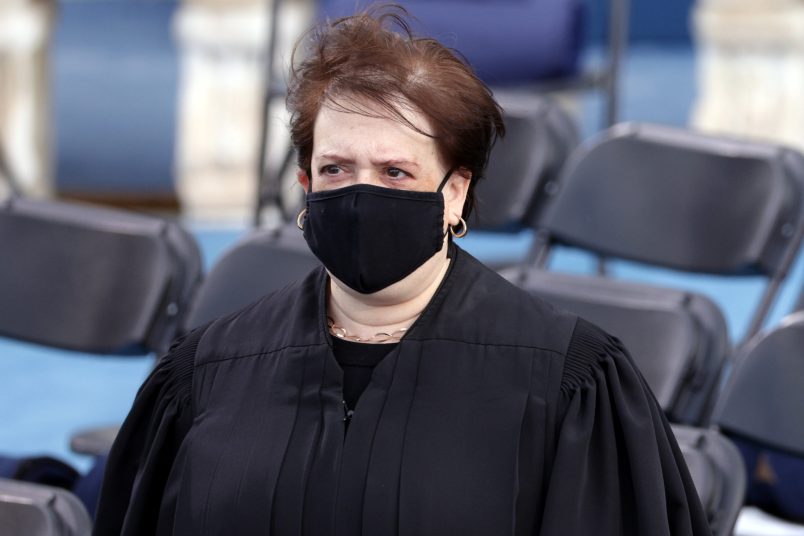The Supreme Court heard oral arguments Tuesday that drill to the heart of executive branch power and states’ attempts to curtail it.
This case centers on guidance from the Department of Homeland Security issued in 2021 directing law enforcement officers towards specific categories of undocumented immigrants to target for apprehension and removal. Texas and Louisiana oppose the policy, grounding their standing in the argument that the policy will levy indirect costs to them by making them keep more immigrants detained, or provide them with social services.
Other states sued too, but were fairly quickly stymied by the Sixth Circuit Court of Appeals, which found them unlikely to succeed on the merits. Texas and Louisiana experienced greater success at the lower courts, in part after choosing to file suit in a Texas district where they were guaranteed to get a Trump-appointed judge with a history of hostility toward Biden administration immigration policy. That district judge, soon upheld by the right-wing Fifth Circuit Court of Appeals, blocked the DHS memo not only for the states who sued, but universally.
That glaring red flag for the separation of powers was not lost on Justice Elena Kagan Tuesday.
“Immigration policy is supposed to be the zenith of federal power and it’s supposed to be the zenith of executive power,” she said. “Instead, we’re creating a system where a combination of states and courts can bring immigration policy to a dead halt.”
She was pointed about the judge shopping element too.
“In Texas, there are divisions within districts, you can pick your trial court judge — you play by the rules, that’s fine,” she said. “But you pick your trial court judge and one judge stops a federal immigration policy in its tracks because you have a kind of sort of speculative argument that your budget is going to be affected.”
It’s an issue the government has repeatedly raised too: if states can claim injury from a federal policy for something as indirect as one dollar in potential costs to them, it’s easy to see an entire world of federal policy suddenly up for debate in the courts.
The arguments, sometimes quite granular, created odd bedfellows at times. Chief Justice John Roberts appeared to take great offense at the government’s argument that lower courts may have been incorrectly interpreting the appropriate remedy for Administrative Procedure Act cases, and was joined in his indignation by fellow D.C. Circuit Court alums Justices Brett Kavanaugh and Ketanji Brown Jackson. (The D.C. circuit hears many similar agency-related cases.)
The case has already engendered an unusual split: Justice Amy Coney Barrett joined the liberals in dissenting from the court’s earlier decision to let the lower court block the DHS policy while the case wound its way through the court.
But at other times on Tuesday, the ideological inclinations were more predictable.
Justice Samuel Alito bemoaned the government trying to create a “rule of special hostility to state standing” in its arguments that Texas and Louisiana do not have standing to challenge the DHS policy.
While the case is ostensibly about one immigration memo, it’s also another chance for the Supreme Court’s right-wing majority to chip away at executive branch power and, specifically, the power of executive branch agencies to determine how they implement the laws Congress passes. The red states are challenging the government’s prosecutorial discretion in choosing which undocumented immigrants to target as the most potentially dangerous — against the backdrop that the government says it lacks the resources to go after every single person with varying degrees of black marks on their records — an area where the executive has formerly enjoyed broad latitude.
If the court does side against DHS, it’ll be another chapter in its broader hostility towards powerful executive branch agencies — and could give red states a blueprint to thwart Biden administration policies they don’t like.







But that’s the point of all this and other nonsense isn’t it?
What day is the Reichstag fire scheduled for…I want to clear my calendar.
We know that the fix is in and the corrupted court will channel their inner Fuentes.
Why is this a matter for the courts? Isn’t this the sort of political issue that should be worked out by the legislative and executive branches. Ultimately this gives the Supreme Court power that I don’t think the framers intended.
Well, then I guess we understand what the outcome will take place in the near term. Should we assume that her prediction is about to come to pass?
This article almost makes it seem as if the courts are hopelessly politicized. Who could imagine such a thing?